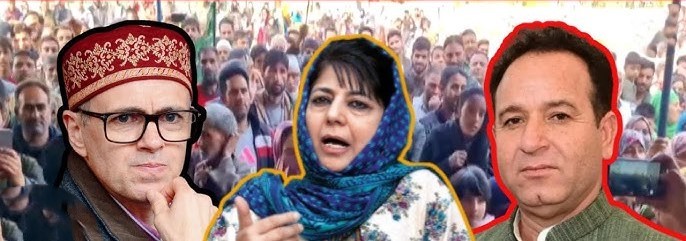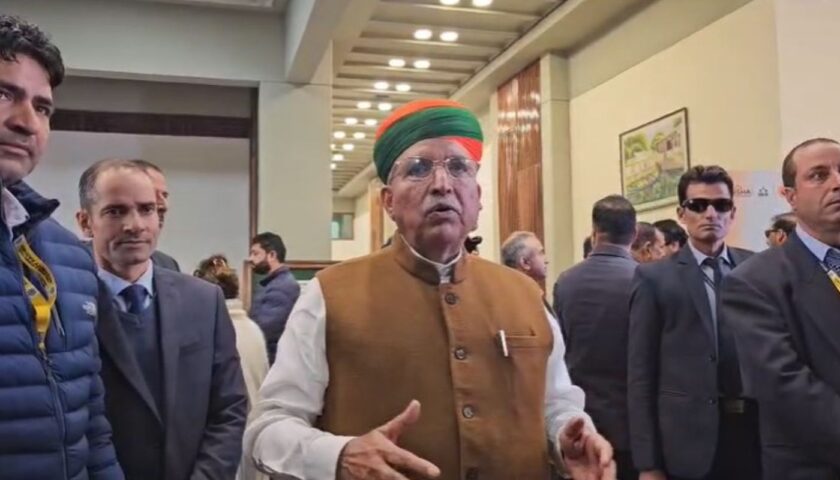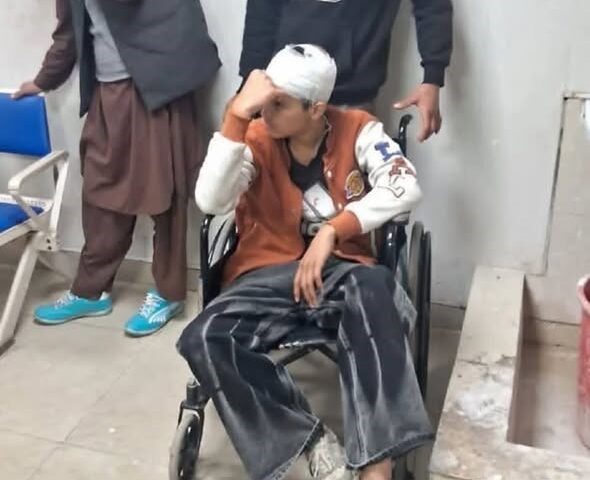Jammu & Kashmir is witnessing a fierce four-way political clash involving Omar Abdullah, Mehbooba Mufti, Sunil Sharma, and Aga Ruhullah, each representing distinct ideological and strategic positions.
By: Javid Amin | 09 November 2025
The Four Forces Shaping Kashmir’s New Political Chessboard
As Jammu & Kashmir inches toward its most consequential elections since the abrogation of Article 370, the region finds itself at the crossroads of legacy, reform, ideology, and accountability.
In this complex political theatre, four distinct voices dominate the stage — Omar Abdullah, Mehbooba Mufti, Sunil Sharma, and Aga Ruhullah — each representing a vision of Kashmir’s future, and each vying to rewrite its political destiny.
While Omar Abdullah positions himself as the restorer of pre-2019 dignity and institutional order, Mehbooba Mufti paints herself as the defender of the dispossessed, Sunil Sharma channels Delhi’s nationalist agenda through the language of development and anti-corruption, and Aga Ruhullah speaks to the heart of disillusioned youth — seeking emotional justice where legal restitution has failed.
The result?
A four-way political collision, as unpredictable as it is pivotal, reflecting a region’s ongoing struggle to define its identity in the shadow of constitutional transformation.
Mehbooba Mufti vs Omar Abdullah: The Battle for Dignity, Land, and Legacy
Land Grant Rules and the ‘Bulldozer Politics’ Flashpoint
In the heart of Srinagar, former Chief Minister Mehbooba Mufti has mounted a fierce campaign against what she calls the “systematic dispossession” of ordinary Kashmiris.
Her opposition to the Land Grant Rules, 2022 — which prevent the automatic renewal of leased land for hotels, educational institutions, and homes — has become a rallying cry.
According to these rules, land leases held for decades by private owners and small institutions must now revert to the government unless re-auctioned.
Mehbooba calls this “economic bulldozing under bureaucratic disguise.”
“These laws are not about legality; they’re about humiliation,” she said in Budgam.
“People who nurtured their land for generations are now being treated as encroachers.”
In response, her “Anti-Bulldozer Bill” seeks to regularize long-held land tenures and prevent what she calls “selective demolitions.”
The move positions the PDP as the voice of the economically marginalized and the politically alienated — an image the party lost after its controversial 2015 alliance with the BJP.
Omar Abdullah’s Counter: Accusing PDP of Political Opportunism
The National Conference (NC) under Omar Abdullah has countered Mehbooba’s populist push by accusing her of “playing politics on pain.”
Omar argues that Mehbooba’s sudden empathy is selective — pointing out that the PDP government (2015–2018) itself initiated multiple eviction drives and approved lease terminations in tourist zones.
“The PDP brought the BJP into our homes,” Omar said recently.
“Now they pretend to be victims of the same policies they enabled.”
His message is clear: Mehbooba’s activism is less about justice and more about survival in a hostile electoral climate.
By framing the debate as one of integrity vs opportunism, Omar seeks to reclaim the NC’s traditional space as the “protector of rights” and delegitimize PDP’s rebranded populism.
The Deeper Contest — Dignity vs Memory
Both leaders are fighting not just for votes, but for emotional ownership of Kashmir’s post-Article 370 narrative.
-
For Mehbooba Mufti, the battle is personal and redemptive — a struggle to prove that PDP still stands for the ordinary Kashmiri.
-
For Omar Abdullah, it’s about restoring political relevance and proving that the NC remains the only party capable of navigating Delhi with dignity.
Their rivalry captures Kashmir’s central dilemma:
Can a politics born in grievance reinvent itself as a politics of governance?
Sunil Sharma and BJP’s Calculated Offensive: The Politics of Accountability
BJP’s New Face in J&K
As the BJP’s Leader of Opposition, Sunil Sharma has emerged as the saffron party’s sharpest regional voice.
Young, assertive, and unapologetically nationalist, Sharma is spearheading the BJP’s accountability offensive — accusing the NC and Congress of fostering corruption, instability, and separatist sentiment.
At a rally in Jammu, Sharma thundered:
“These dynastic parties looted J&K for seventy years.
They kept people poor and blamed Delhi for everything.
It’s time for a clean government, not a family business.”
His remarks were in direct response to reports of alleged irregularities in the Roads & Buildings (R&B) Department, which the BJP claims occurred during NC’s tenure.
Sharma has demanded a CBI probe, even calling for Omar Abdullah’s resignation.
Nationalism Meets Development
Unlike earlier BJP campaigns that focused solely on national security, Sharma’s narrative blends developmental pragmatism with nationalist conviction.
He frequently highlights projects such as:
-
The Udhampur-Srinagar-Baramulla rail link,
-
AIIMS Jammu,
-
Hydropower projects in Kishtwar and Doda,
-
And new industrial corridors aimed at boosting employment.
By linking these initiatives to BJP’s governance record, Sharma positions the party as the builder of a “New Kashmir” — one that is modern, connected, and integrated into India’s growth story.
“The youth don’t want to inherit wounds; they want to build futures,” Sharma told supporters in Banihal.
This blend of aspiration and accusation defines Sharma’s political craft — appealing to both urban middle classes and first-time voters disillusioned with traditional parties.
Religious and Symbolic Undertones
At times, Sharma’s rhetoric takes on a symbolic and cultural dimension, invoking themes of unity, patriotism, and faith.
He often contrasts “temples and textbooks” with “terror and turmoil,” drawing clear ideological lines between BJP’s developmental vision and the “soft separatism” he attributes to NC and PDP.
Analysts see this as strategic polarization — not to alienate, but to consolidate Jammu’s electorate and make inroads into Kashmir’s youth demographic through aspirational nationalism.
Aga Ruhullah: The Voice of Emotional Justice and Generational Reflection
A Reformist Within the System
Among the four, Aga Syed Ruhullah Mehdi, a senior NC leader from Budgam, represents a subtler, introspective current in Kashmir’s politics.
While aligned with Omar Abdullah’s NC, Ruhullah often speaks in tones that challenge both his own party and its rivals.
“Our politics must feel the pain of the people again,” he said in a recent interview.
“We cannot talk about power when hearts remain broken.”
His speeches often return to themes of emotional equity, post-370 trauma, and youth alienation — areas where conventional politics has gone silent.
Unlike Omar or Mehbooba, who emphasize restoration and resistance respectively, Ruhullah’s discourse is reformist, moral, and identity-based, appealing to the introspective middle ground that neither side fully owns.
Youth and the Lost Generation
Ruhullah’s rising appeal stems from his empathetic connection with Kashmir’s post-conflict youth — a generation grappling with unemployment, identity fatigue, and disillusionment with both Delhi and Srinagar.
He has urged his own party to evolve ideologically, saying that NC “must not remain a party of memories but a party of meaning.”
“We can’t just demand what was taken. We must also offer what was never given — trust, opportunity, and respect.”
This framing situates Ruhullah as a bridge figure — one who articulates pain without succumbing to bitterness, and reform without abandoning tradition.
Four Voices, Four Visions: Mapping the Political Spectrum
| Leader | Party | Core Message | Strategic Focus | Voter Base |
|---|---|---|---|---|
| Omar Abdullah | National Conference (NC) | Restore dignity, restore statehood | Governance & stability | Traditional NC loyalists, educated urban electorate |
| Mehbooba Mufti | Peoples Democratic Party (PDP) | Defend land, defend people | Populist, grassroots appeal | Rural and economically marginalized |
| Sunil Sharma | Bharatiya Janata Party (BJP) | Clean governance, end dynasties | Development & nationalism | Jammu belt, youth & first-time voters |
| Aga Ruhullah Mehdi | National Conference (Reformist) | Emotional equity, youth voice | Moral & identity politics | Youth, intellectuals, moderate voters |
Thematic Fault Lines Defining J&K’s Political Moment
01. Land and Dignity
Mehbooba vs Omar encapsulates Kashmir’s land anxiety — the fear that legal reforms may erode ownership and cultural identity.
While Omar calls for administrative review, Mehbooba mobilizes the street, giving PDP a grassroots revival narrative.
02. Corruption and Governance
Sunil Sharma’s demand for a CBI investigation and anti-corruption rhetoric has cornered NC and Congress — forcing Omar to defend past administrative lapses.
It’s a powerful theme among middle-class voters and employees who see “clean government” as a prerequisite for progress.
03. Identity and Emotional Equity
Aga Ruhullah’s interventions introduce moral politics — a rare appeal to empathy, memory, and reconciliation.
This could prove influential among younger, issue-based voters who are skeptical of both Delhi’s promises and Srinagar’s theatrics.
04. Delhi vs Srinagar
Each leader’s stance toward the Centre is calibrated for survival:
-
Omar walks a line of institutional pragmatism.
-
Mehbooba maintains a posture of defiance.
-
Sharma aligns fully with Delhi.
-
Ruhullah speaks of self-respect over sovereignty.
The Road to 2026: Realignments and Risks
The 2025 bypolls and the anticipated 2026 Assembly elections will determine not just who governs J&K, but how politics is defined in the post-370 era.
Potential Realignments
-
NC and Congress may revive a tactical alliance to block BJP expansion.
-
PDP could focus on issue-based mobilization — land, power tariffs, and representation.
-
BJP will intensify its “development-first” narrative, possibly co-opting local independents.
-
Aga Ruhullah’s faction may evolve into an ideological force within or outside NC, reshaping the discourse from within.
Risks and Rewards
The main risk for all players is narrative fatigue.
Voters have heard promises of dignity, statehood, and development for years.
Without tangible change — jobs, healthcare, and stability — emotional appeals may no longer suffice.
Bottom-Line: Kashmir at the Crossroads of Reform and Recall
The political story of Jammu & Kashmir today is not one of clear binaries, but of overlapping aspirations.
Omar Abdullah seeks redemption through restoration.
Mehbooba Mufti pursues relevance through rebellion.
Sunil Sharma promises renewal through reform.
And Aga Ruhullah demands reflection through empathy.
Together, they mirror the psyche of a region suspended between memory and modernization — where every leader speaks for a different Kashmir, yet all claim to defend its soul.
As J&K stands on the cusp of another electoral cycle, one truth endures:
The battle is no longer just for power, but for the right to define what “normalcy” means in the new Kashmir.




